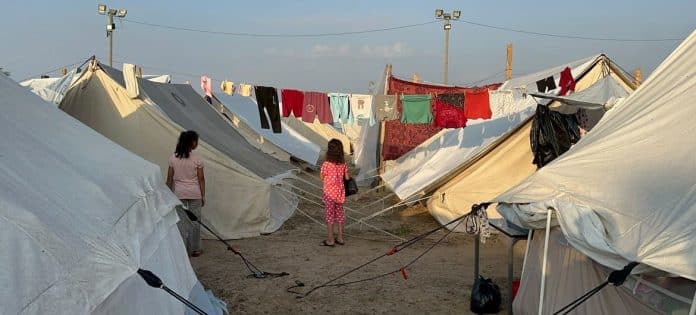Most of the 80 countries and international organisations present at the international humanitarian conference for the civilian population of Gaza, organised by French President Emmanuel Macron in Paris this week, called for an “immediate humanitarian ceasefire” in Gaza and for expanded access for essential aid.
“We must step up to assist and protect civilians in Gaza. That means an immediate humanitarian ceasefire,” said United Nations Secretary-General António Guterres in a video message to the conference.
Philippe Lazzarini, Commissioner General of the UN Relief and Works Agency for Palestine Refugees in the Near East (UNRWA), told the French president he was seeking “your urgent support” for “a humanitarian ceasefire, along with strict adherence to international humanitarian law.”
“In plain terms, this is a cessation of fighting for humanitarian purposes to provide some respite from the onslaught, to expedite the delivery of humanitarian aid, and to facilitate the release of hostages. This must be our objective and our priority,” said Martin Griffiths, head of the UN Office for the Coordination of Humanitarian Affairs (OCHA).
Children killed are not collateral damage
A month since Hamas militants killed 1,400 people in Israel, taking over 240 hostage, the Israeli offensive into Gaza continues and has led to thousands of civilian deaths. The total death toll has passed 10,000, according to figures from the Ministry of Health in Gaza.
“Thousands of children killed cannot be ‘collateral damage’. Pushing a million people from their homes and concentrating them in areas without adequate infrastructure is forced displacement. Severely limiting food, water and medicine is collective punishment,” said Mr. Lazzarini. He recounted seeing children begging for water or a piece of bread while on the ground in Gaza last week.
No “safe zones” in Gaza
UN representatives voiced concern about the displacement of people to the south of Gaza.
“The UN cannot be part of a unilateral proposal to push hundreds of thousands of desperate civilians in Gaza into so-called safe zones,” said Mr. Griffiths.
“On behalf of the humanitarian community that I represent, I can tell you that we have serious concerns: Concerns about the safety of civilians in any so-called safe zones if there is no agreement between all the parties on their establishment. Concerns that satisfactory conditions do not exist anywhere in Gaza to ensure adequate shelter, food, water, sanitation and health. And concerns regarding the protection of civilians anywhere in Gaza,” he added.
A trickle of authorised aid
Mr. Guterres reiterated his condemnation of the “abhorrent acts of terror” committed by Hamas against Israel and again called for the unconditional release of all hostages. He underlined support for civilians in Gaza who now “face a never-ending humanitarian nightmare”, stressing that “now is the time for concrete action.”
All the representatives of humanitarian organisations present, both UN and NGOs, emphasised that there was an insufficient volume of aid entering Gaza via Rafah, the only crossing point authorised by Israel.
“We need to get hundreds of trucks per day into Gaza, not dozens, and be allowed to reach every place people are sheltering,” said Mr. Griffiths.
“The volumes remain too small to match the massive humanitarian needs,” echoed Ursula Van der Leyen, President of the European Commission. “While we fully support to increase the capacity of aid delivered through Rafah – and this is our first priority –, we also need to look urgently at additional routes.”
The UN and its partners have launched an appeal for $1.2 billion to help 2.7 million people – the entire population of the Gaza Strip and half a million Palestinians in the West Bank, including East Jerusalem.
UNRWA also needs immediate funds to pay the salaries of its employees on the ground. The UN agency, which has paid a particularly high cost in this conflict with 99 staffers to date killed in Gaza, will be unable to pay its workers’ salaries by the end of the year, Mr. Lazzarini warned. Several countries taking part in the conference, including France with 100 million euros and the European Union, assured UNRWA of their support.
Fear of regional contagion
Mr. Lazzarini expressed concern at the “dehumanising rhetoric” that has been circulating since 7th October.
“References to Palestinians as (I quote) “terrorists”, “human animals” and “people to be erased” is unconscionable and demonstrates a startling lack of empathy. It poisons the hope of any shared future and fuels anger and resentment in the region and beyond.”
“The current conflict is a wildfire that could consume the region – with wide-ranging global impacts – unless we bring it under control,” said Mr. Griffiths. “Unless multilateral and diplomatic efforts can be maximised to ensure the protection of civilians, enhance humanitarian access and secure the release of the hostages so viciously taken on October 7th, I have real fears that this could just be the beginning.”
The conflict has already spread quietly to the West Bank, where, according to Mr. Lazzarini: “military incursions by the Israeli Forces and settler violence have caused record high death tolls among Palestinians.”
“If we did not have Gaza today, all our attention would be on the West Bank,” he added.
A return to peace?
Echoing the call of UN Secretary-General António Guterres, most of the participants at the conference advocated a two-State solution.
“A genuine prospect of Palestinian statehood is critical […] to stabilise the region,” said Mr. Lazzarini. “It is in the interest of all, including Israel, to find a solution that allows Israelis and Palestinians to live in peace, side by side.”

